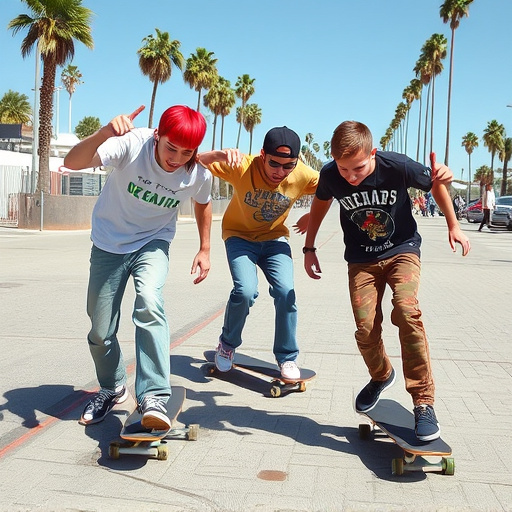Generation X skateboarders emerged as trailblazers in the 1980s and 1990s, challenging societal norms and redefining skateboarding through vibrant self-expression. Their non-conformist attitude and resilient spirit inspired modern skaters to embrace individualism, pushing boundaries and leaving their mark on the sport. Today, their legacy fosters community and collaboration, encouraging modern skaters to organize inclusive events that exchange ideas and knowledge, ensuring skateboarding's continued growth and vibrancy.
“In an era defined by daring and nonconformity, Generation X skateboarders left an indelible mark on the world of skateboarding. This generation’s unique approach to the sport not only reshaped the skateboarding landscape but also offered profound lessons that remain relevant today. From embracing individuality and cultivating self-expression to fostering community and overcoming adversity, modern skaters can draw inspiration from their Generation X counterparts, continuing to push boundaries and redefine the art of skateboarding.”
- Embracing Individuality: How Generation X Skaters Defied Norms
- The Art of Self-Expression: Learning to Communicate Through Skateboarding
- Overcoming Adversity: Resilience in the Face of Societal Challenges
- Community and Collaboration: Building a Culture Through Shared Passion
Embracing Individuality: How Generation X Skaters Defied Norms

Generation X skateboarders were pioneers who embraced their individuality, defying societal norms and carving their own paths. In a time when conformist trends were prevalent, they chose to stand out. These skaters challenged conventional ideas of what a skater should look like, act like, or dress like, instead celebrating unique styles and personal expressions. Their attitude was one of non-conformity; they rejected the mainstream and embraced the unconventional, which led to an incredibly diverse and vibrant skateboarding culture.
This generation’s defiance of norms paved the way for self-expression in a sport often associated with youth rebellion. They encouraged others to be true to themselves, fostering a community that valued authenticity and creativity. The impact of Generation X skateboarders’ attitude can still be seen today, as modern skaters continue to push boundaries and challenge expectations, leaving their own indelible mark on the sport.
The Art of Self-Expression: Learning to Communicate Through Skateboarding

Skateboarding, as a form of self-expression, flourished during the era of Generation X skateboarders. This unique subculture provided a creative outlet for individuals to communicate their thoughts, emotions, and personal identities. The art of self-expression through skateboarding allowed Generation Xers to challenge societal norms and create a sense of community among fellow skaters. By embracing individualism and embracing the unconventional, these skateboarders left an indelible mark on the sport’s landscape.
Modern skaters can draw inspiration from Generation X’s unapologetic approach to self-expression. It encourages skaters today to explore their creativity, experiment with unique styles, and use their boards as a canvas for personal narratives. Learning from this legacy fosters a deeper connection to the sport, enabling skaters to communicate their stories and experiences in innovative ways.
Overcoming Adversity: Resilience in the Face of Societal Challenges

Generation X skateboarders grew up in a time marked by significant societal shifts and challenges. From economic downturns to cultural unrest, they navigated a landscape that often felt unpredictable and unwelcoming. Despite these obstacles, many Generation X skateboarders displayed remarkable resilience—a trait that remains highly relevant for modern skaters facing their own unique set of hurdles.
Their ability to persevere in the face of adversity offers valuable lessons. They learned to embrace challenges as opportunities for growth, developing a strong sense of self-reliance and adaptability. This resilience has translated into an unyielding spirit that encourages modern skateboarders to push through failures, overcome obstacles, and emerge stronger—a testament to the enduring impact Generation X skateboarders have had on shaping today’s skating culture.
Community and Collaboration: Building a Culture Through Shared Passion

The spirit of community and collaboration among Generation X skateboarders is a testament to their unique culture, built on a shared passion for skating. In the 1980s and 1990s, as the sport was gaining popularity, these skaters fostered a sense of camaraderie that transcended competition. They would often gather at local skate parks, sharing tips, tricks, and stories while shaping each other’s skills and perspectives. This collaborative environment wasn’t just about learning new stunts; it was about building relationships and creating a supportive network that enhanced their overall skateboarding experience.
Modern skaters can learn from this by embracing community-focused initiatives. Organising local events, workshops, or group skating sessions can foster a similar sense of belonging and camaraderie. Collaborating with fellow enthusiasts allows for the exchange of ideas, knowledge, and even equipment, enriching the overall skateboarding culture. By drawing inspiration from Generation X skateboarders’ emphasis on community, modern skaters can create a more inclusive and supportive environment, ensuring that their shared passion continues to thrive and evolve.
Generation X skateboarders broke barriers and redefined the sport, leaving a lasting legacy for modern skaters. By embracing individuality, they challenged societal norms and paved the way for self-expression through skateboarding as an art form. Their resilience in the face of adversity serves as an inspiration to persevere, while their collaborative spirit demonstrates the power of community in fostering a shared passion. Learning from these Generation X skateboarders, contemporary skaters can continue to push boundaries, express themselves authentically, and build strong, supportive communities within the sport.
